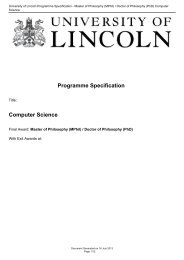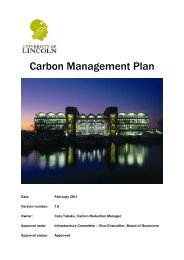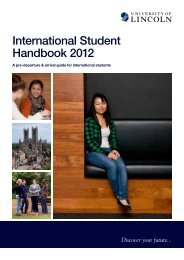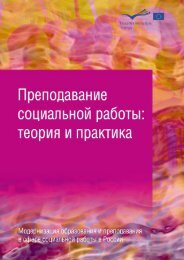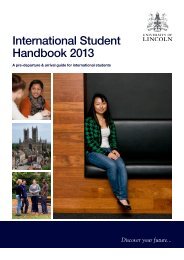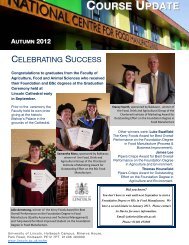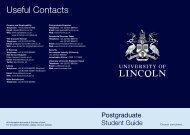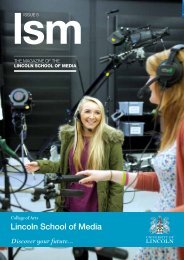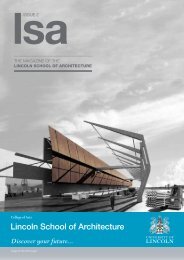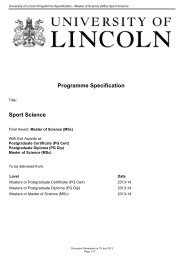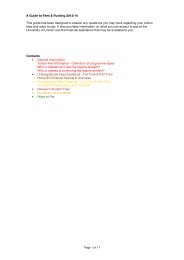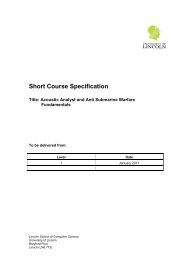LSH Magazine Issue 4 (PDF) - University of Lincoln
LSH Magazine Issue 4 (PDF) - University of Lincoln
LSH Magazine Issue 4 (PDF) - University of Lincoln
- No tags were found...
You also want an ePaper? Increase the reach of your titles
YUMPU automatically turns print PDFs into web optimized ePapers that Google loves.
MAMAHistorical StudiesThe MA in Historical Studies introduces students to a range <strong>of</strong> newand exciting approaches to studying the past that have emerged inrecent years.Students study core modules onResearch Methods and Approachesto Historical Inquiry. A range <strong>of</strong> optionalchoices then allows students todevelop their own specialised interestsacross a range <strong>of</strong> historical themes,including medieval, early modernand modern British, European andAmerican history. The course alsohelps students develop a variety <strong>of</strong>skills that enable them to undertaketheir own research projects, leadingto a 15-20,000 word dissertationon a topic <strong>of</strong> their own choice. The<strong>University</strong> <strong>of</strong> <strong>Lincoln</strong> is ideally placedfor students’ research interests, witheasy access to a wide range <strong>of</strong> archivalsources at <strong>Lincoln</strong>shire Archives,<strong>Lincoln</strong> Cathedral Library and<strong>Lincoln</strong> Central Library.Medieval StudiesThe MA in Medieval Studies encourages students to explore the depthand breadth <strong>of</strong> resources available in the medieval city <strong>of</strong> <strong>Lincoln</strong> –home to one <strong>of</strong> the few surviving original copies <strong>of</strong> the Magna Cartaand to one <strong>of</strong> the greatest medieval cathedrals in the country.Historical archives, literary manuscriptsand the built environment are all usedto introduce students to advancedstudy <strong>of</strong> the Middle Ages. The coursealso makes use <strong>of</strong> the remarkablerange <strong>of</strong> medieval archives in <strong>Lincoln</strong>,to teach skills such as palaeographyand to explore the economic, socialand religious history <strong>of</strong> England.The wealth <strong>of</strong> literary manuscriptsat <strong>Lincoln</strong> Cathedral, including one<strong>of</strong> only fifty full manuscripts <strong>of</strong> theCanterbury Tales and the ThorntonRomances containing the earliestknown account <strong>of</strong> King Arthur’sdeath, supports modules in medievalliterature and Arthurian studies.Historical modules consider Englishecclesiastical history with a localfocus on <strong>Lincoln</strong>, the largest medievaldiocese, medieval concepts <strong>of</strong> timeand space and how these developed,and theories <strong>of</strong> gender, particularlymedieval concepts <strong>of</strong> masculinity.Cultural studies forms an importantand unique part <strong>of</strong> this programme:students can consider the enduringlegend <strong>of</strong> King Arthur, deconstructinghis image as ideal ruler andreconsidering him in his social context,or the beginnings <strong>of</strong> medievalism inthe Renaissance in their consideration<strong>of</strong> medieval literature. They will havethe opportunity to pursue their ownparticular interests through theirfinal dissertation.Reproduced by kind permission <strong>of</strong> the Dean and Chapter <strong>of</strong> Herefordand the Hereford Mappa Mundi Trustees www.herefordcathedral.orgStudent view:Darren CookeBA (Hons) History 2009-12MA Historical Studies2012-13To come to <strong>Lincoln</strong> <strong>University</strong> to studyHistory was a logical decision; the cityitself has a fascinating history, with thecastle and cathedral at the top <strong>of</strong> thehill providing a consistently impressivevisual reminder <strong>of</strong> the past. Alongsidethis, the facilities and staff present atthe <strong>University</strong> <strong>of</strong>fer a flexible and alwaysinteresting experience <strong>of</strong> learning aboutthe past - in particular, I found thefriendly and enthusiastic nature <strong>of</strong> mytutors made the transition from A-Levelto higher education effortless. Outside<strong>of</strong> my course, the vibrant social life thatthe city <strong>of</strong>fers meant I made long-lastingfriendships and had a fantastic timedoing so.I enjoyed the three years as anundergraduate so much that I continuedonto the MA to further develop my skillsin a more critical learning environment.In the process, I have discoverednew avenues <strong>of</strong> historical interest thatI aim to pursue further in the next fewyears, and gained the confidence andqualifications needed to progress inan extremely competitive field <strong>of</strong> study.Student view:Jayne McMathMA Medieval StudiesMy decision to enrol on the MedievalStudies course was influenced bythe wealth <strong>of</strong> resources available inthe Cathedral Library and the CountyArchives <strong>of</strong> <strong>Lincoln</strong>, as well as thebeautiful historical setting <strong>of</strong> the city itself.It is a great asset to be able to study parttime over two years which fits in well withwork and family commitments. I havefound the compulsory modules, HistoricalResearch and Palaeography a real aidto research. There are a wide range<strong>of</strong> modules to choose from, coveringthe entire Medieval period, which to acertain extent can be chosen to suityour preferred method <strong>of</strong> assessment,ie assignment; exam or presentation.Palaeography and Latin seminarsprovide a great basis for the deciphering<strong>of</strong> medieval documents and there isscope to pursue areas <strong>of</strong> personalinterest within the assignments,projects and especially the dissertation.As well as the weekly seminarsthere is the chance to attend extracurricular lectures and workshops,which provide additional interest andawareness <strong>of</strong> research opportunities.Every module, whether compulsoryor personal choice, is backed upby expert support and guidance.Kate has worked at the <strong>University</strong> <strong>of</strong><strong>Lincoln</strong> since 1995, and specialises inBritish social and cultural history <strong>of</strong> thenineteenth century. She is particularlyinterested in the history <strong>of</strong> museumsand how that illuminates both thecultural issues <strong>of</strong> the Victorian period,and the issues facing museums today.Her books include Culture and Classin English Public Museums 1850-1914(2005) and Museums and Biographies(2012). She is Chair <strong>of</strong> the Museums andGalleries History Group and a founder <strong>of</strong>the Midlands Interdisciplinary VictorianStudies Seminar. On the HistoricalStudies MA she co-ordinates the coreResearch Methods module and also<strong>of</strong>fers the popular option, History andthe Public. She has supervised a number<strong>of</strong> MA dissertations on cultural history,and is also currently supervising threePhD students.Staff pr<strong>of</strong>ile:I’m a historian <strong>of</strong> late antiqueand early medieval Spain and theMediterranean. My research focuseson the transmission <strong>of</strong> knowledgeand identity from the ancient to themedieval world via two processes:history-writing and education. I’vedone a lot <strong>of</strong> work on Isidore <strong>of</strong> Seville,a Spanish bishop (and the patronsaint <strong>of</strong> the Internet) who wrote abook called the Etymologies, a sort <strong>of</strong>Wikipedia for the early middle ages. Atthe moment I’m developing a projectthat explores the role <strong>of</strong> violence inthe schools and monasteries <strong>of</strong> thelater Roman Empire. I’ve previouslytaught in History, Classics and AncientHistory, and Religions and Theologyat the Universities <strong>of</strong> Manchester,Liverpool, Warwick and Sheffield, andhave done a lot <strong>of</strong> research into theuse <strong>of</strong> innovative methods for teachingHumanities subjects. I’m really lookingforward to leading new modules nextsemester called The Rise <strong>of</strong> Islam andThe Goths: Barbarians through time.Staff pr<strong>of</strong>ile:Dr Kate HillDr Jamie WoodProgramme LeaderLecturer in History12 MA Historical Studies1312th century paintings in the royal pantheon <strong>of</strong> San Isidoro in Leon, Spain



